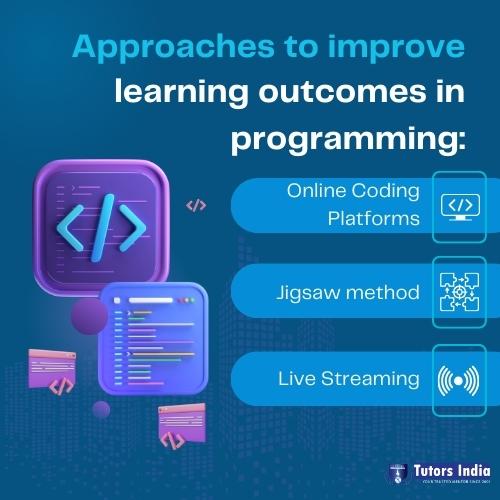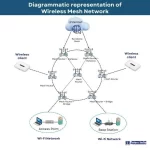Optimizing Learning Outcomes in Programming Education: A Multifaceted Approach
Programming as a desirable skill in today’s world
With the advancement in technology, programming has become a crucial skill for students specializing in the field of computer science. An in-depth understanding of concepts related to programming is a must for success in this field. Online learning platforms have been created and have gained popularity with the increasing demand for programming skills in today’s highly competitive market. Existing components for learning about programming include assignments, records and assessments. Various educational institutions have explored various methods that can improve learning outcomes in students and address the challenges in learning about programming languages (Jana, 2023).
Various approaches to improve learning outcomes in programming education

- Online Coding Platforms
A study by Zinovieva et al. (2021) studied the use of online coding platforms for improving proficiency in programming language. A comparative description of various online platforms for teaching programming based on specific criteria was created, and projects from the online platform hackerrank.com that have already been used to instruct students were selected. Online programming simulators have a lot of potential to help organize a successful distance learning system. In the learning process, online simulators can be used as an adjunct for the development of professional competencies, allowing for more intensive participation of students in the process of developing code and actual (situational) application of current information. Gamification of the training process for future IT experts helps to boost cognitive activity and, the quality of the educational process, especially distance education.
- Jigsaw method
Further, research on using cooperative methods by using the Jigsaw technique was conducted by Garcia (2021) to determine if the method was effective in improving programming skills. The programming language focused in this study were C++ and novice programmers (introductory programming learners) were selected for the study. The study revealed that this technique significantly helped students to improve their learning outcome compared to the control group. There were improvements in the attitude and self-efficacy of the participants trained using the jigsaw technique. Live streaming could also be an option for educating students and increasing their programming & Algorithm skills.
- Live Streaming
Also, a study by Cheng et al. (2021) discovered various challenges in live streaming and measures that can be used to address them for educating students about programming languages. While the challenges included privacy issues, difficulty in sharing and online harassment, the measures consisted of developing personalized learning environments, measures for content retrieval and developing healthier learning environments.
Future Research Directions
While previous studies have demonstrated live streaming, collaborative learning and online coding platforms, there were some gaps, such as use of only one programming language, developing healthier learning environments and over-emphasis on online platforms. The gaps can give ise to the following directions.
A study on the quality of blended learning approach for programming language
The study topic is based on the limitation of a study by Tadlaoui et al. (2021), which focuses on blended learning approach used for learning Python. Although most students were satisfied with blended learning approach, the quality of this approach could not be assessed.
- Check out our Study Guide on Getting Started with Python, to know about how to start using Python.
Expanding the use of Cooperative learning methods for complex tasks in programming
Although the study by Garcia (2021) highlighted the positive outcomes of learning using the jigsaw method for C++, it was limited to the basics. Study could be done for advanced programming tasks using the cooperative learning method.
Conclusion
Programming is considered an important skill in Computer Science. The increased demand for programming skills has resulted in the emergence of online learning platforms, which have proven to be a valuable resource. Previous research has looked into the benefits of online coding platforms, live streaming, and cooperative methods, all of which contribute to enhanced learning experiences in programming. These findings show the potential of online tools and collaborative methods in increasing students’ programming engagement and competency. Future research directions include investigating the quality of blended learning approaches for programming languages and increasing cooperative methods to solve complex programming tasks.
To know about how a dissertation is written in different domains, check out our dissertation examples.
About Tutors India
We are a team of academic researchers who offer comprehensive dissertation help to master’s students. We understand the challenges students face while writing a dissertation and offer personalized guidance. Moreover, we are adept with using various programming languages, which helps students with various aspects like web development, software development, deep learning, machine learning and artificial intelligence tools etc.. Moreover, we strictly adhere to the university guidelines, which significantly improve the quality of their dissertations.
References
- Jana, A, Yadav, P., Desai, O., Pawar, N., Solanki, R. K., & Bhaladhare, P. R. (2023). Multi-Disciplinary Approach and Efficient Algorithm for Programming Learning Platform Design. J. of Aquatic Science, 14(1), 404-425.
- Zinovieva, I. S., Artemchuk, V. O., Iatsyshyn, A. V., Popov, O. O., Kovach, V. O., Iatsyshyn, A. V., … & Radchenko, O. V. (2021, March). The use of online coding platforms as additional distance tools in programming education. In Journal of physics: Conference series(Vol. 1840, No. 1, p. 012029). IOP Publishing.
- Garcia, M. B. (2021). Cooperative learning in computer programming: A quasi-experimental evaluation of Jigsaw teaching strategy with novice programmers. Education and Information Technologies, 26(4), 4839-4856.
- Chen, Y., Lasecki, W. S., & Dong, T. (2021). Towards supporting programming education at scale via live streaming. Proceedings of the ACM on Human-Computer Interaction, 4(CSCW3), 1-19.
- Tadlaoui, M. A., & Chekou, M. (2021). A blended learning approach for teaching python programming language: towards a post pandemic pedagogy. International Journal of Advanced Computer Research, 11(52), 13.

 Previous Post
Previous Post